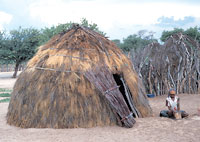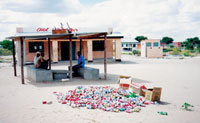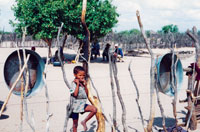
Photos courtesy of: Survival International
It’s the middle of the month, and nearly all of the residents of New Xade, a dusty resettlement camp on the edge of Botswana’s Central Kalahari Game Reserve, are lining up in the muggy heat. Today is food-aid day, and sacks of cornmeal are being tossed from a government truck parked near a mound of dirty cabbage. A wizened woman shuffles forward, leading her blind husband behind her by a thin stick. In the reserve she might have foraged for wild sweet potatoes, but here she has no choice but to wait for their rations — the edible plants she knows don’t grow here. Nor is there any game to hunt, which perhaps explains why a scrum of men sits sullenly in the shade out front of a bar, building a pile of empty Castle Lager cans.
The 1,500 residents of New Xade represent many of the remaining Bushmen of the Central Kalahari. In 2002, in a move that Botswana’s government trumpeted as bringing the Bushmen into the modern age and that international observers decried as a grab for diamonds, these villagers were rounded up from their ancestral homes and relocated — stick huts and all — into three camps like this one. The relative isolation that had kept them safe from the AIDS pandemic is now only a memory. “Here we are burying people week by week or daily,” says Roy Sesana, head of the advocacy group First People of the Kalahari (FPK). “We can’t call that development.”
But unless Sesana and his fellow Bushmen win the right to return to the Kalahari in a lawsuit now before Botswana’s High Court, it’s here the Bushmen are likely to end their days, reduced to collecting handouts in communities overrun with disease, alcoholism, and despair. “This,” resident Tshara Johannes tells me, gesturing toward the garbage-strewn streets and loitering drunks, “is the place of perishing.”

It was never supposed to end this way. In 1961, Botswana’s British administrators created the Central Kalahari Game Reserve to preserve the Bushmen’s way of life. The nomads, also known as the San, were being persecuted by Afrikaner farmers to the south and Botswana’s dominant, cattle-rearing Tswana tribes to the north. By the late 1950s, only a few thousand survived, far out in the scorched desert. Books like Sir Laurens Van Der Post’s The Lost World of the Kalahari popularized the Bushmen’s plight among the British, spurring a movement to grant them a place of their own. For the next three decades, these ancient people — whose rock art dates back some 30,000 years — were allowed to live deep in the Switzerland-sized reserve much as they had for millennia.
But in the mid-1980s, government officials from the Tswana tribe began talking about the need to integrate the Bushmen into modern society. “How can we continue to have Stone Age creatures,” President Festus Mogae asked, “in an age of computers?” There was only one problem: These “creatures” had no desire to move. (Mogae’s remark reflects a legacy of disdain. Prior to independence, Bushmen were often used as forced labor on Tswana ranches.)
But many observers, including a coalition of groups led by Bushmen and backed by indigenous rights organizations in Africa and Europe, believe that there was an ulterior motive to the government resettlements: vast diamond deposits under the Kalahari sand. In Botswana, diamonds are the engine of development, and since the relocations, wide swaths of the Kalahari have been leased to diamond companies for exploration. “In 35 years of campaigning for the rights of indigenous people,” says Robin Hanbury-Tenison, president of the London-based indigenous rights group Survival International, “this is the nastiest and least excusable case I have ever come across.”
In the end, it may not matter whether the Bushmen were moved as the result of misguided paternalism or a grab for mineral wealth. What is beyond dispute is that the Bushmen — hunter-gatherers now marooned in a cash economy and separated from their places of spiritual power — have been driven to the brink of cultural extinction.
That the relocations didn’t happen sooner is a testament to the aptly named John Hardbattle. A half-Bushman farmer’s son, Hardbattle founded First People of the Kalahari in 1992 to spread a simple message: The reserve belonged to the Bushmen, and they deserved a role in determining their future. It was an easy case to make; Botswana’s postindependence constitution limits entry into the reserve “for the protection of well-being of Bushmen.” Hardbattle eloquently hammered this point home before the United Nations and in the international press, forcing Botswana’s government to back down from its initial relocation efforts.
But after Hardbattle died unexpectedly in 1996, it was only months before a government convoy rolled into the reserve, emptying much of it virtually overnight. Huts were dismantled and loaded into trucks, along with their owners, while many of their animals were left behind for the lions. Cash and cattle — promised to those who signed away any rights of return — came late or, in many cases, not at all.

The European press erupted with stories about “ethnic cleansing,” and for a time a few remaining settlements stood untouched. But in February 2002, these people, too, were rounded up and, in the words of the U.S. State Department, “forcibly resettled” to New Xade. To make sure there was no coming back, water holes were sealed over. Tshara Johannes showed me around the now empty meadow where the village had stood for generations. “The people were just taken and thrown into the trucks,” he said. Then he repeated over and over, “They just poured the water out on the ground.” In the Kalahari, to dump water is to sentence someone to death.
A day’s drive from the squalor of New Xade is the sprawling capital of Gaborone, with its gated neighborhoods and shopping malls. Lest anyone forget who’s sponsoring the development, billboards opposite the government buildings proclaim “Debswana: Mining The Resource, Enriching The Nation.” Debswana (a contraction of De Beers and Botswana) is the national mining company, which splits the profits from the mines with the government. It’s a strikingly intimate connection between a corporation and a democratic government — it being common for Debswana officials to simultaneously hold top government positions. President Mogae himself recently said the relationship was less like a marriage and more like “Siamese twins.” Survival International’s director, Stephen Corry, is more blunt: “Botswana is a company town, owned by De Beers.”
If so, it’s a wealthy town. Mining has turned Botswana into southern Africa’s economic powerhouse: The nation is the world’s top producer of diamonds by value, and the gems represent some 60 percent of government revenues. Money from diamonds has bankrolled the gleaming office towers alongside the Parliament complex.
Inside those air-conditioned offices, officials defend the relocations and deny accusations they took place at the behest of their mining partners. “It was necessary for them to relocate, so that they could be helped to lead sustainable, self-reliant livelihoods,” says Foreign Ministry spokesman Clifford Maribe. The Bushmen had outgrown their traditional lifestyles and were killing off all the reserve’s animals. Plus, he adds, it was too expensive to continue providing services to the Bushmen while they remained in the reserve.
It’s true that the Bushmen were no longer isolated from the modern world. Their traditional skin breechcloths had long ago given way to secondhand clothes. Food subsidies were handed out to children and the elderly, and a clinic provided rudimentary health care. Still, traditional foods composed the majority of the Bushman diet. And at night they would still gather to perform the ancient trance dances that connected them to their spirit world.
While the Bushmen continued to hunt, mostly with bow and arrow, the government’s claims that they were decimating the reserve’s animals don’t wash with its own Department of Wildlife and National Parks report, which shows that the game in the reserve had actually doubled in the decade before the relocations began. And as for the cost of providing services, consider this: Maintaining a clinic, school, and police station in the reserve cost the government around $13,000 per month. To date, the price tag of the resettlement efforts is more than $11 million.
If New Xade is progress, the Bushmen want none of it. But whether they still have any claim to their Kalahari homeland is at the heart of the case currently before Botswana’s High Court. The lawsuit, brought by Sesana and 243 others, contends the Bushmen have the right to live, hunt, and gather freely in the Kalahari, which they say was given to them by God — not to mention the constitution. A decision is expected early this year.
Given the conflicting rationales for the relocations, many observers keep coming back to the one most strongly denied: diamonds. “We’ve picked through all the reasons they gave,” says Survival International’s Corry, “and absolutely none of them made any sense at all. The only thing left is diamonds.”
The likelihood of finding diamonds in the Central Kalahari Game Reserve is clear — draw a line between Botswana’s record-producing Orapa and Jwaneng mines, and it runs straight through the reserve and the former Bushman community of Gope.
In November 2002, just before the last evictions, President Mogae proclaimed, “There is neither any actual mining nor any plan for future mining inside the reserve.” But immediately following the removals, virtually the entire reserve and surrounding countryside was leased out by the Ministry of Mineral Resources. Along with Debswana, BHP Billiton, the world’s largest mining company, has leased some 78,000 square kilometers in and near the reserve, backed by $2 million in loan guarantees from the World Bank. (In November, a World Bank ombudsman began investigating whether that loan violates the bank’s policies on protecting indigenous peoples.)
Botswana’s government has lashed out at Survival International and their PR efforts linking the removals to diamonds. Foreign Affairs Minister Akolang Tombale — who does double duty as the deputy chairman of Debswana — calls Survival International workers “terrorists,” and claims that the Bushmen campaign is merely a fundraising gimmick. The British group makes for a much easier opponent than, say, the Northern Cape Khoisan (Bushmen) Council of South Africa, which passed a declaration demanding “De Beers and the Botswana Government…rescind their decision to evict” the Bushmen, which it considers a “human rights atrocity.”
Despite their insistence of altruistic intentions behind relocating the Bushmen, however, government officials are blunt about where cultural heritage and wildlife preservation fall on the list of national priorities. “If we can discover a lot of diamond deposits in any part of this country,” Minister of Local Government Michael Tshipinare told me over a cup of tea, “whether it is in a game reserve or outside, and it is minable — we’re going to mine it.”
To see the land at the center of this dispute means a two-day drive, bouncing along a sandy track cut through thorny scrub that occasionally gives way to shallow pans, where skittish wildlife gather to graze. It’s along this road that as many as 400 Bushmen, facing a life of subsidized despair in the resettlement camps, have been slipping back to their homelands, enduring harassment by government scouts and risking arrest.
More than 130 miles from the nearest pavement, I come upon the rebuilt village of Molapo, a circle of thatch huts now home to about 70 men, women, and children. In the shade of an acacia tree, clad in an assortment of cast-off overcoats, too-big shoes, and the occasional animal-hide wrap, the women sort roots and fruit while an aged, infirm hunter sits erect in a place of honor, children playing at his feet.
As their stories tumble out, it’s clear that if life was difficult in the reserve before, it’s worse now. The hunting that plays such a critical part of their diet and culture has been outlawed, and so is done furtively, if at all. Government scouts regularly harass residents, something returnee Gakeitswe Gaorapelwe knows well. He was one of 13 men arrested for poaching, and he says he spent three days handcuffed to the bull bars of a wildlife officer’s Land Rover. (The charges were later dropped for lack of evidence.)
Yet despite the challenges, when asked whether staying is worth it, the entire community responds: “Yes, yes. All of us.”
“The roots here are better,” says Gaorapelwe. Reaching into his pocket, he offers me a finger-sized branch. Peeled, it reveals a soft, sweet fiber that tastes like yam. When asked why they were relocated, he says, “The government has seen some diamonds here; that’s why it decided to take us out. I don’t think it, I know it — I was told that” by a district official. To my surprise, Molapo’s residents tell me they would even be willing to work in the mines — anything, they say, so long as they can stay.
Remaining in the Kalahari is essential to the Bushmen’s “survival as a distinct people,” the United Nations Human Rights Commission warned in 2002. What is yet to be seen is whether Botswana’s High Court will judge this culture, and these people, worthy of preservation.















